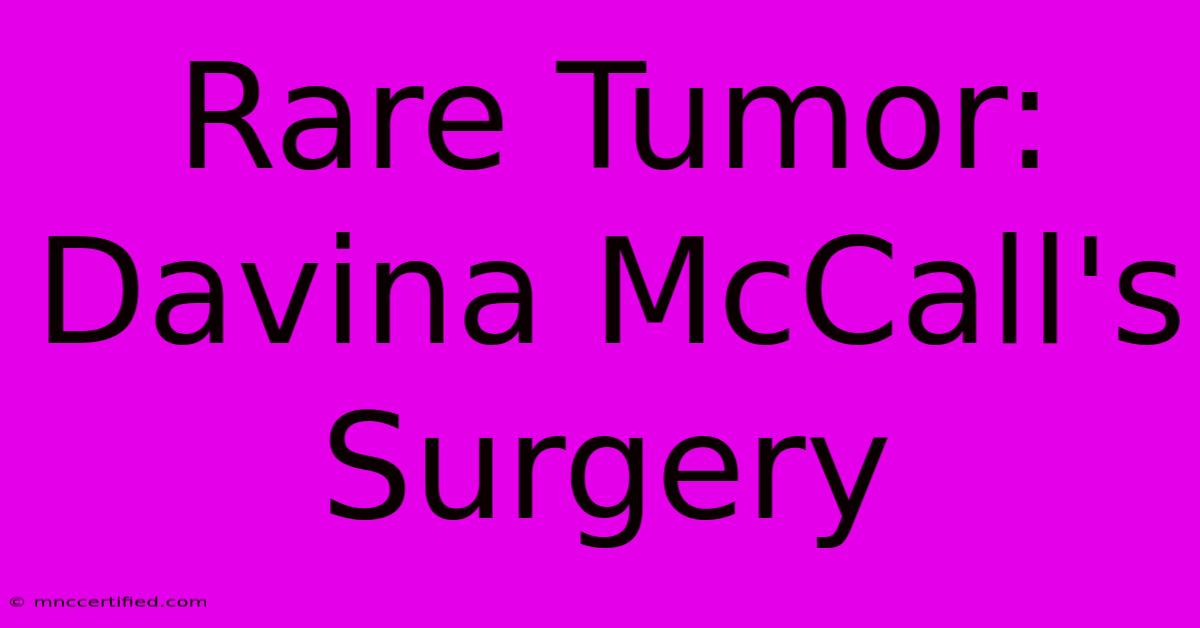Rare Tumor: Davina McCall's Surgery

Table of Contents
Davina McCall's Surgery: Raising Awareness for Rare Tumors
Davina McCall, a beloved British television personality, recently underwent surgery for a rare tumor. Her public announcement has shone a much-needed spotlight on the challenges faced by individuals diagnosed with less common cancers and the importance of early detection. This article will delve into Davina's experience, discuss the significance of raising awareness about rare tumors, and offer resources for those seeking further information.
Understanding Rare Tumors: The Challenges of Diagnosis and Treatment
The term "rare tumor" encompasses a wide range of cancers that individually affect a small percentage of the population. This rarity presents several significant challenges:
- Delayed Diagnosis: Due to their infrequent occurrence, rare tumors are often less familiar to medical professionals, leading to potential delays in diagnosis. Symptoms might be mistaken for more common ailments, delaying crucial intervention.
- Limited Research: The limited number of patients diagnosed with rare tumors translates to less research funding and a slower pace of advancements in treatment strategies.
- Specialized Care: Effective treatment often requires access to specialists and specialized facilities equipped to handle these unique cases. This can pose geographical and financial barriers for many patients.
Davina McCall's openness about her experience highlights these very challenges. While she hasn't publicly specified the exact type of tumor, her willingness to share her journey is invaluable in raising awareness and encouraging others to seek medical attention if they experience concerning symptoms.
The Importance of Early Detection
Early detection is crucial for any cancer, but especially so for rare tumors. Early diagnosis significantly improves the chances of successful treatment and better long-term outcomes. Therefore, it's vital to:
- Know your body: Pay attention to any unusual changes or persistent symptoms.
- Seek medical attention promptly: Don't hesitate to consult a doctor if you have any concerns. Early diagnosis can make a world of difference.
- Advocate for yourself: If you feel your concerns are not being taken seriously, seek a second opinion.
Davina McCall's Impact: A Catalyst for Change
Davina McCall's courage in sharing her personal health journey has had a profound impact. By bringing her experience into the public eye, she's achieved several crucial things:
- Increased Awareness: Her story has sparked conversations about rare tumors, prompting many to learn more about these often-overlooked conditions.
- Destigmatization: Openly discussing cancer helps to reduce the stigma associated with the disease, making it easier for others to seek help.
- Encouragement for Research: Increased public attention often leads to greater funding and research opportunities for rare cancers.
Her actions serve as an inspiration to others facing similar challenges and a call to action for improved healthcare systems and research funding.
Resources and Further Information
For reliable information on rare tumors and cancer support, consider exploring these resources:
- Your National Cancer Institute (e.g., The National Cancer Institute in the US, Cancer Research UK): These organizations offer comprehensive information on various cancer types, including rare ones.
- Support Groups: Connecting with others facing similar experiences can provide invaluable emotional support and practical advice. Online support groups and patient advocacy organizations can be found easily through online search engines.
Conclusion:
Davina McCall's surgery serves as a powerful reminder of the importance of raising awareness about rare tumors. Her bravery in sharing her story has the potential to save lives by encouraging early detection and fostering a greater understanding of the challenges faced by those affected. By continuing to share information and support research, we can make a difference in the lives of individuals diagnosed with these often-overlooked conditions. Remember, early detection is key, and seeking medical attention when necessary is crucial for positive health outcomes.

Thank you for visiting our website wich cover about Rare Tumor: Davina McCall's Surgery. We hope the information provided has been useful to you. Feel free to contact us if you have any questions or need further assistance. See you next time and dont miss to bookmark.
Featured Posts
-
Davina Mc Call Recovering Post Surgery
Nov 16, 2024
-
Wake Forest Volleyball Campbell Adapts
Nov 16, 2024
-
The Insurance Center Eau Claire Wi
Nov 16, 2024
-
Lenny Rush Children In Need Star
Nov 16, 2024
-
Vaccine Skeptic Rfk Jr For Health Chief
Nov 16, 2024